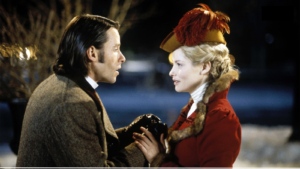Summary of the Novel “The Time Machine”
H.G. Wells’ “The Time Machine” is a classic science fiction novel that delves into the possibilities of time travel and explores the consequences of a society divided by class.
Set in Victorian England, the Time Traveler, the protagonist of the story, invites a group of acquaintances to demonstrate his invention. He unveils a small, elegant machine resembling a miniature sled with a saddle, which he claims can travel through the fourth dimension – time. Skeptical yet intrigued, his guests eagerly anticipate the machine’s trial. The Time Traveler mounts the contraption and disappears into the future.
The Time Traveler finds himself in the year 8,02,701 AD, where he discovers a world that has evolved into two distinct species: the Eloi and the Morlocks. As he investigates further, the Time Traveler discovers that the Eloi are descendants of the privileged upper classes, while the Morlocks evolved from the working class who retreated underground to escape societal oppression.

The Eloi are beautiful, frail, and peaceful beings living above ground in a utopian-like society. However, they lack curiosity, intelligence, and physical prowess.
The Morlocks became adapted to the dark environment, evolving into a subterranean species while maintaining control over the Eloi as a source of food. The Morlocks live underground and have evolved into a nocturnal, ape-like species. They possess strength and intelligence but are savage and sinister.
Initially fascinated by the Eloi and their seemingly idyllic existence, the Time Traveler soon realizes the dark truth behind their civilization. He discovers that the Morlocks prey on the Eloi, feeding on them like livestock. As he investigates further, he learns that the Morlocks maintain their underground domain, working machinery and surviving in darkness, while the Eloi live above, ignorant of the imminent danger lurking beneath.
The Time Traveler befriends an Eloi named Weena and tries to understand the dynamics of this future world. He witnesses the dark reality of the Eloi’s existence and confronts the Morlocks in an attempt to rescue Weena and escape. However, in the process, he loses his time machine and is stranded in this distant future.
Desperate to retrieve his machine, the Time Traveler confronts the Morlocks in their den. He discovers that they fear light and uses fire to fight them off. Eventually, he finds his time machine, narrowly escapes the Morlocks, and embarks on a journey through different time periods, hoping to find a safe haven.
Throughout his travels, the Time Traveler witnesses the gradual changes in the Earth’s landscape and the evolution of life forms. He observes the death of the planet’s sun and witnesses the final days of life on Earth as the world plunges into darkness and cold.
Finally, the Time Traveler returns to his own time, where he recounts his extraordinary adventure to his friends. However, the veracity of his tale is doubted, and some consider it a hallucination or a fanciful story. He is left to ponder the implications of what he has seen, contemplating the fragility of human civilization and the potential divergence of humanity into disparate species.
“The Time Machine” is not merely a thrilling tale of time travel but also a social commentary on the class divide and the potential consequences of societal structures. It explores themes of evolution, entropy, and the cyclical nature of existence. Wells uses the device of time travel to present a cautionary vision of the future, urging readers to contemplate the trajectory of humanity and the potential outcomes of unchecked social inequality.
The book contains some great quotes which clearly reflect higher intellectual level of the author, some of them are as follows-
“We should strive to welcome change and challenges, because they are what help us grow. With out them we grow weak like the Eloi in comfort and security. We need to constantly be challenging ourselves in order to strengthen our character and increase our intelligence. ”
“It is a law of nature we overlook, that intellectual versatility is the compensation for change, danger, and trouble. An animal perfectly in harmony with its environment is a perfect mechanism. Nature never appeals to intelligence until habit and instinct are useless. There is no intelligence where there is no change and no need of change. Only those animals partake of intelligence that have a huge variety of needs and dangers.”
“It sounds plausible enough tonight, but wait until tomorrow. Wait for the common sense of the morning.”
“Face this world. Learn its ways, watch it, be careful of too hasty guesses at its meaning. In the end you will find clues to it all.”
“There are really four dimensions, three which we call the three planes of Space, and a fourth, Time.”
About the author H.G. Wells-
H.G. Wells was born on 21 September 1866 in Kent, England. His father was a cricket player and shopkeeper, and his mother was a maid of a lady. Wells was interested in education and academics since his early age. He completed graduation in biology with the help of scholarship. The time machine was his first novel which became very successful. Later his novels The island of Dr Moreau and The Invisible Man made him popular as a writer of science fiction. He also wrote short stories and non-fiction. His book A Short History of the World is a well known historical no-fiction.